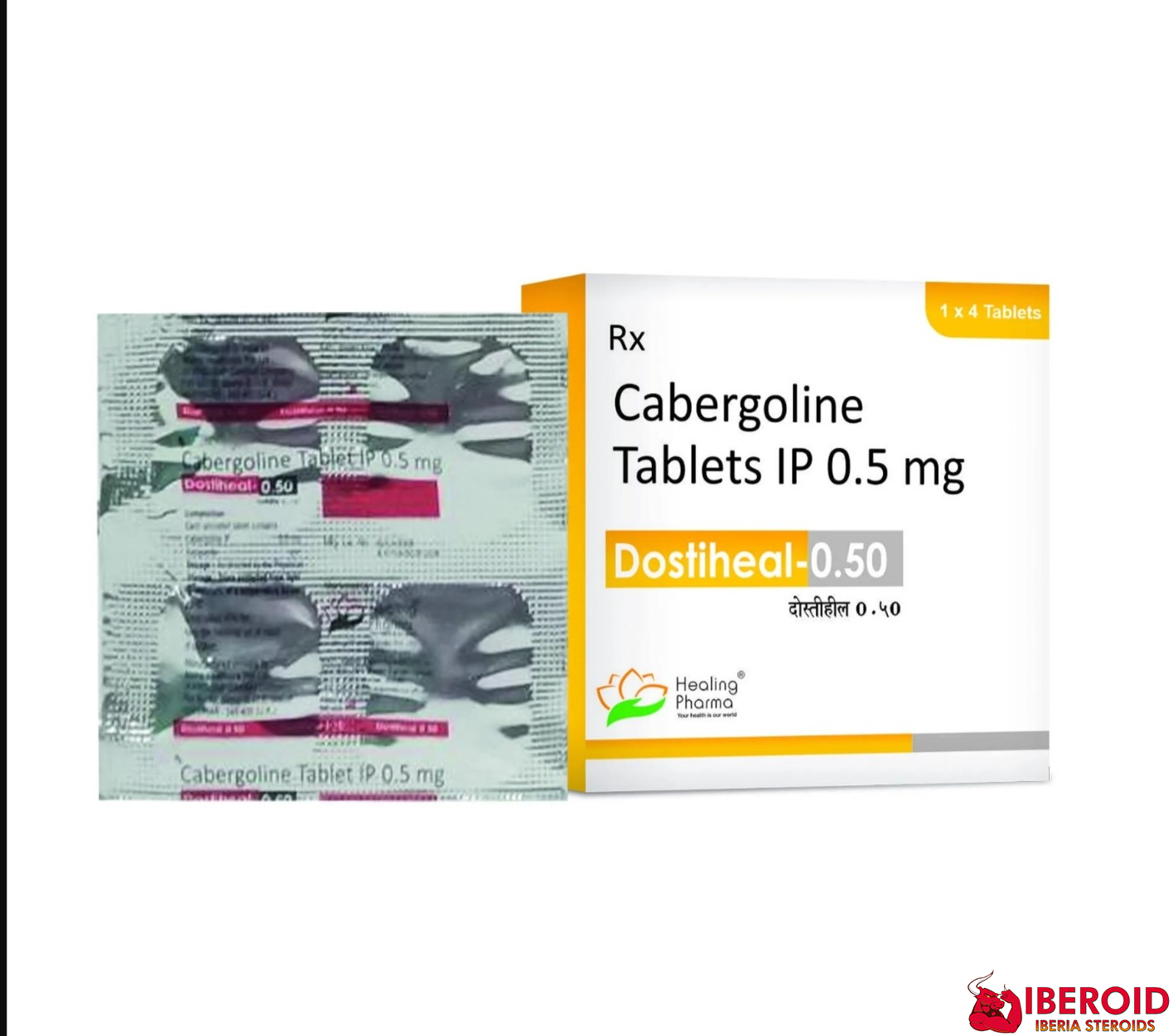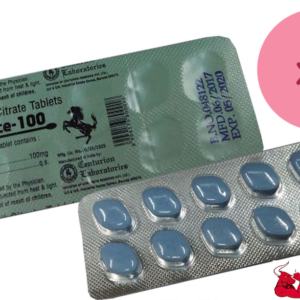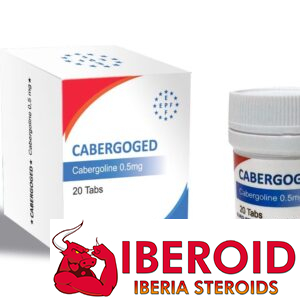Description
DOSTIHEAL / CABERGOLINA 0.50X4 tabs.
Dostiheal 0.5 Cabergoline oral tablets treat high prolactin disease. Abnormally high prolactin can cause menstrual changes in women, impotence in men, and breast changes in both sexes.
High prolactin causes infertility in men and women, and the risk of pituitary tumors. Dostiheal 0.5 may also be prescribed to suppress milk production in women after giving birth.
Dostihea 0.5 medicine is used to cut off milk, wean, and eliminate milk in cases of weaning babies, as prescribed by a doctor.
Ask your doctor if you have any questions about why this medication has been prescribed for you.
Your doctor may have prescribed it for another reason.
Dostinex is available only with a doctor’s prescription.
What effects does Dostiheal 0.5 have? mechanism?
Mechanism of action:
Prolactin secretion by the anterior pituitary is mainly under the control of hypothalamic inhibition. Prolactin is secreted through the release of dopamine by spinal neurons.
Cabergoline is a long-acting dopamine receptor agonist with high affinity for D2 receptors.
Dosage and how to use DOSTIHEAL / CABERGOLINA
Treatment of hyperprolactinemia disorders
Use cabergoline to treat dysfunctions associated with hyperprolactinemia, such as amenorrhea, dysmenorrhea, ovulation issues, and galactorrhea. Additionally, doctors prescribe cabergoline for patients with prolactin-secreting pituitary adenomas (both microscopic and macroscopic), idiopathic hyperprolactinemia, or semiempty sella syndrome with hyperprolactinemia. These conditions contribute to the clinical manifestations mentioned above.
Furthermore, when administered chronically, cabergoline at a dose of 1 to 2 mg weekly is effective in normalizing serum prolactin concentrations in approximately 84% of hyperprolactinemic patients.
Moreover, regular menstrual cycles resumed in 83% of women who had previously lost their menstrual cycles. Restoration of ovulation was noted in 89% of women whose progesterone levels were monitored during the luteal phase.
Finally, galactorrhea disappears in 90% of cases with treatment. Additionally, tumor size reduction is achieved in 50–90% of both female and male patients with microscopic or macroscopic disease.
Dostiheal 0.5 lactation medicine cuts milk production and weaning
Inhibits/suppresses physiological lactation
Dostiheal 0.5 is indicated for the suppression of physiological lactation immediately after birth and for the suppression of established lactation:
After giving birth, when the pregnant mother does not breastfeed the baby or is contraindicated to breastfeed due to medical reasons related to the mother or the person who has just given birth.
After stillbirth or abortion.
Cabergoline prevents/inhibits physiological lactation by inhibiting prolactin secretion.
In controlled clinical trials, cabergoline administered as a single 1 mg dose on the first day of life:
- Effectively inhibits lactation
- Breast tenderness and pain in 70 – 90% of women.
- Less than 5% of women have breast symptoms that recover in the third week after giving birth (usually mild).
Inhibition of lactation, reduction of breast engorgement and pain: achieved in approximately 85% of lactating women treated with a total dose of 1 mg cabergoline divided into 4 doses over 2 days. Recurrence of breast symptoms after day 10 is uncommon (about 2% of cases).
Side effects of Dostiheal 0.5
Serious side effects
- Chest pain or tightness, cough, difficulty breathing
- Unusual drowsiness, drowsiness or weakness
- Unusual changes in behavior
- Numbness, tingling, or burning pain in your hands, arms, legs, or feet
- Dizziness, lightheadedness or fainting
- Changes in how much or how often you urinate
- Swelling in your face, hands, ankles, legs, or feet
- Allergic reaction: Itching or rash, swelling of the face or hands, swelling or tingling in the mouth or throat, chest tightness, trouble breathing
- There is blood in the urine, lower back pain, pain on one side or sharp back pain just below the ribs
- Pain or severe stomach pain
- Fast, slow, pounding, or irregular heartbeat
Side effects are less serious
- Nausea, vomiting, constipation
- Headache
Careful
Tell your doctor if you are pregnant or breastfeeding, or if you think you could become pregnant while using this medicine. Additionally, inform your doctor if you have liver disease, breathing or lung problems, heart disease, or high blood pressure.
Furthermore, Dostiheal 0.5 may cause the following issues: an increased risk of serious heart, kidney, lung, or stomach problems.
Moreover, the first few doses of cabergoline may make you lightheaded or dizzy, especially when you stand up from a lying or sitting position. Therefore, slowly stand up and avoid driving or using machinery if you are not alert.
Your doctor will check your progress and the effects of this medicine at regular visits.
Keep all medicines out of reach of children. Never share your medicine with anyone.
Dizziness, lightheadedness or fainting
Numbness, tingling, or burning pain in your hands, arms, legs, or feet
Pain or severe stomach pain
Swelling in your face, hands, ankles, legs, or feet
Unusual drowsiness, drowsiness or weakness.
Drug interactions
Drug-drug interactions: Dostiheal 0.5 may interact with drugs used to treat:
- Psychosis (chlorpromazine, haloperidol), nausea and vomiting (domperidone, metoclopramide clopramide).
- Parkinson’s disease medications, severe migraine medications (bromocriptine, ergotamine, dihydroergotamine).
- Antibiotics (erythromycin), schizophrenia (phenothiazines, thioxanthene).
Drug-Food Interactions: CABERGOLINE interacts with over-the-counter medications, vitamins, nutritional supplements, and herbal products you are taking or plan to take.
Drug-Disease Interactions: Tell your doctor if you have or have ever had high blood pressure, heart disease, kidney or liver problems, mental illness.
Is DOSTIHEAL / CABERGOLINA good for use?
Dostiheal 0.5 contains cabergoline, the advantage of taking cabergoline is that it will reduce the level of prolactin in your blood and reduce the effects you experience.
It works by increasing a chemical in the brain called dopamine, which reduces the amount of prolactin released.
Besides, CABERGOLINE can also be used to treat other conditions caused by hormonal disorders that can lead to the production of high prolactin levels.
This includes amenorrhea, irregular and very light periods, anovulation and lactation periods, the secretion of milk from your breasts.





 Español
Español Português
Português Italiano
Italiano Français
Français











Reviews
There are no reviews yet